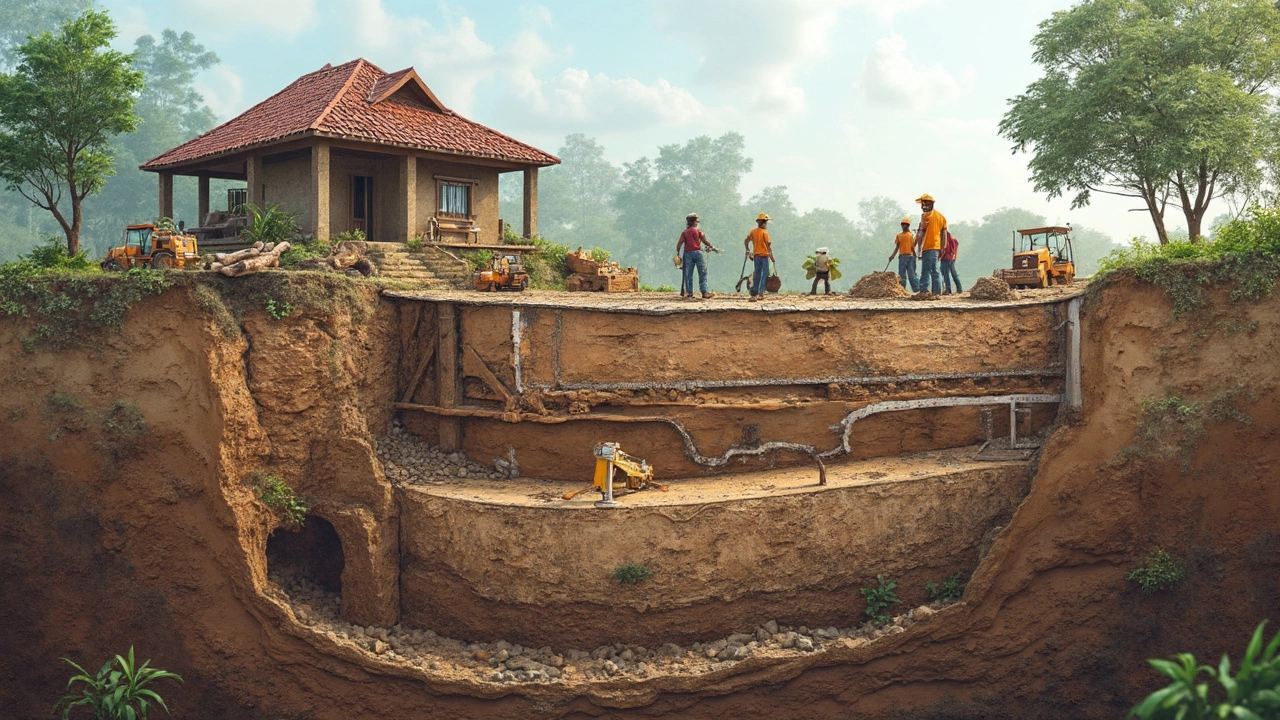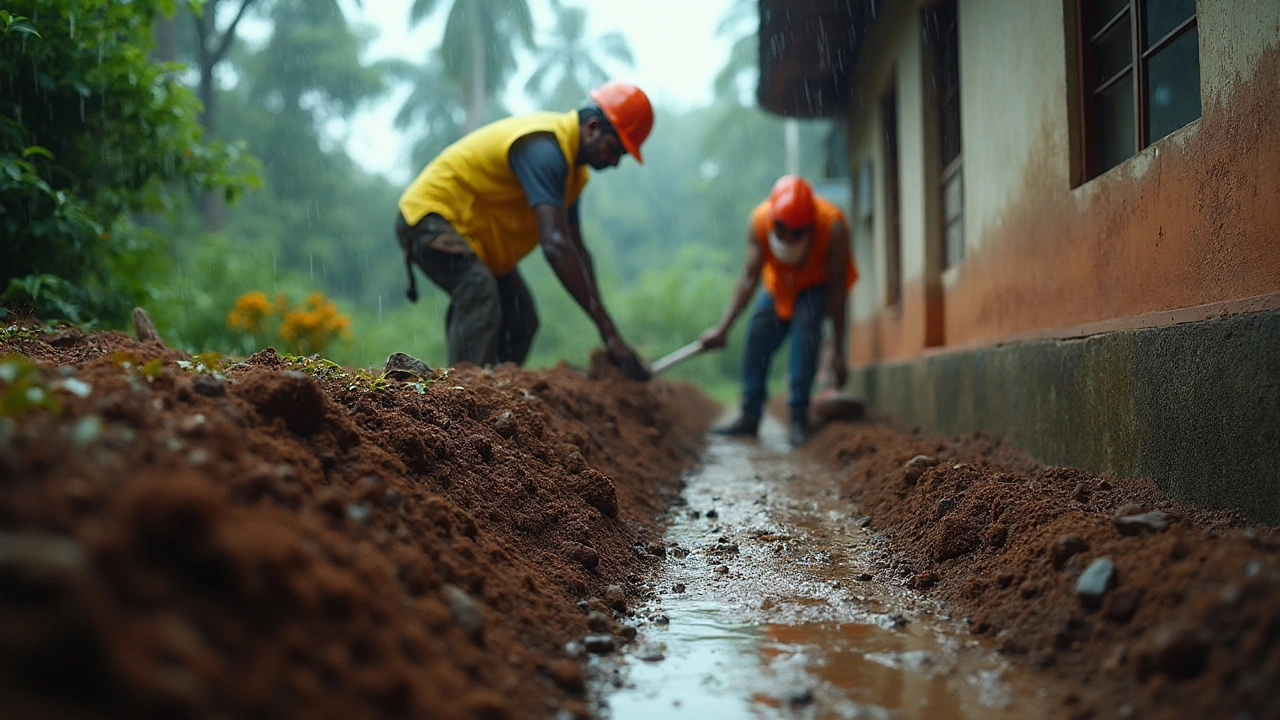What's the Most Expensive Foundation Repair?

Foundation repair isn't something you want to think about unless you have to, and if you do, knowing which repairs are most expensive can save you some heartache. Let's face it, a lot can go wrong under your house, from cracks in the floor to walls separating. But among all the things that can go wrong, some repairs can really hit the wallet hard.
When talking about costs, it's important to consider the signs that suggest you actually need a repair. Doors that don't close right, uneven floors, or visible cracks in the exterior brick are all red flags. Ignoring them won't make them go away—they're often a sign of something going on beneath the surface. Catching these issues early can make a huge difference in your repair bill.
So, what makes certain repairs so expensive? Well, it often depends on the severity of the damage and the methods needed to fix it. Big structural fixes usually cost the most, especially if your foundation is sinking or needs a full replacement. These aren't your quick-fix jobs; they often require heavy machinery and skilled workers to get things right.
- Signs Your Foundation Needs Repairs
- Factors Influencing Repair Cost
- The Most Expensive Repair Types
- Cost-Saving Tips for Homeowners
- When to Call in the Experts
Signs Your Foundation Needs Repairs
Spotting potential foundation issues early can save you a lot of stress and money. But what should you be looking out for? There are a few telltale signs that your foundation might need some professional attention.
Cracks Inside and Outside
Check for cracks on your walls, both inside and outside. While hairline cracks often aren't a big deal, horizontal cracks or stair-step cracks in brickwork can be signs of a more serious issue. Don't forget to check your basement walls if you have them.
Doors and Windows Sticking
Doors and windows that suddenly don't fit right or keep sticking can be a major clue. If you've ruled out humidity or paint, it could mean your walls are shifting because of foundation problems.
Uneven or Sagging Floors
If your floors are looking less than level, this could suggest a problem underneath that needs pretty immediate attention. Use a marble or small ball to check—if it rolls away quickly, you've probably got some issues.
- Foundation repair is more critical when floors visibly slope.
- Uneven floors can lead to other problems like cracks in walls.
Gaps Around Exterior Windows or Doors
Step outside and take a look. Gaps around your exterior windows or doors might mean your foundation is settling unevenly. If water gets in, that's an even bigger risk, as it can cause more damage.
Water in the Basement
Any sign of moisture or water pooling in your basement isn't something you should ignore. It can indicate that your foundation isn't holding back moisture properly.
Living or Working in a Flood-Prone Area
If your area is prone to flooding, always be on alert. Heavy rain or floods can greatly affect old or weakened foundations. Keep an eye on things, even if you've yet to experience problems.
Knowing these signs ensures you're staying one step ahead, which helps in preventing the costliest foundation repair types. A little vigilance can go a long way in saving your home, your sanity, and your bank account.
Factors Influencing Repair Cost
Not all foundation repair jobs are created equal. There are several factors that can blow up the cost of fixing your home's foundation, and being aware of these can help you plan and budget effectively.
Size of the Problem
The first thing that's going to determine how much you'll spend is the size of the problem. Obviously, deeper or longer cracks are more challenging and expensive to fix than small ones. According to Derek Stanley, a structural engineer, “The extent of damage plays a crucial role in determining repair methods and costs.”
Foundation Type
The type of foundation your home sits on also matters. A concrete slab foundation might have different issues compared to a pier and beam setup. Each type has its own repair techniques and related costs.
Location and Accessibility
If your foundation isn't easy to get to, that can add to the bill. Houses on slopes or with lots of landscaping may take more time and effort to access, which gets expensive fast. It's something to keep in mind when you're planting those new bushes.
Material Costs
Like anything else in construction, the cost of materials can fluctuate. What was affordable last year might be a different story today. Prices of concrete, steel, and other repair materials play into the final tab.
Local Climate
Surprisingly, the weather can also affect repair costs. Extreme climates, whether too hot, cold, or wet, can make foundations shift more than usual. This might require specific techniques and materials, potentially increasing costs.
| Factor | Impact on Cost |
|---|---|
| Problem Size | More damage = higher cost |
| Foundation Type | Different methods, different costs |
| Location | Hard-to-reach areas cost more |
| Materials | Price can go up with fluctuation |
| Climate | Extreme weather affects difficulty |
Knowing what factors into expensive foundation repair can help you understand the quotes you get and maybe even negotiate a better deal. Just keep your eyes open for those signs, so you can address problems before they become bank-busting nightmares.

The Most Expensive Repair Types
When it comes to foundation repair, certain types stand out as big-budget challenges. If you think a few cracks are the worst of your problems, brace yourself. Some issues dig deeper—literally and financially.
Sinking Foundation Solutions
A sinking foundation is like a nightmare for homeowners. The solutions usually involve underpinning, where workers install piers deep into stable soil to give your home a proper footing again. Expensive foundation repair is often unavoidable here due to the equipment and labor needed for this heavy lifting.
Complete Foundation Replacement
If your foundation issues are severe, you might face the daunting task of a full replacement. This is as extensive as it gets. They basically take out the old, damaged foundation and build a new one. Not only does this take a lot of time, but it also means you'll likely be living elsewhere—at least temporarily.
Extensive Basement Waterproofing
Water can be the sneakiest villain in the world of foundation problems. If your basement gets frequently flooded, you might need advanced waterproofing systems, which can cost a pretty penny. Systems like sump pumps, drainage tiles, and wall sealers can quickly add up in expenses.
Sifting through foundation repair options reveals a wide price range, but these types often shoot right to the top. It’s like having a bad toothache—you can't ignore it, and fixing it won't come cheap. Knowing what prompts these costly repairs can help you emphasize preventive maintenance, avoiding getting caught off guard by unexpected expenses.
Cost-Saving Tips for Homeowners
When it comes to foundation repair, the costs can be daunting, but the good news is that there are ways to keep those expenses in check. Let's break down some practical tips to help you out.
Regular Inspections
Catch the problem before it gets out of hand. Regularly inspecting your foundation can help you spot issues early, such as small cracks or minor shifts. Set up a yearly schedule or make it part of your seasonal home maintenance routine. The earlier you catch them, the less costly they'll be to fix.
DIY Minor Fixes
Got some minor cracks in the walls or floors? For those that aren't too severe, consider doing a DIY fix. Supplies like masonry caulk or hydraulic cement can be effective for small jobs and cost a fraction compared to hiring a professional. Just make sure you know the limits of what you can safely handle.
Maintain Proper Drainage
Water is notorious for wreaking havoc on foundations. Ensure your gutters and downspouts direct water away from the house. Proper drainage prevents excessive moisture build-up and reduces soil erosion, saving you from costly future repairs.
Use Landscaping to Your Advantage
Believe it or not, your yard can play a big role in maintaining a solid foundation. Plants and shrubbery with deep roots can help to support soil around your foundation. Just make sure not to plant them too close to avoid roots pushing against your home's structure.
Consult Professionals Before Major Work
If you've found something concerning and aren't sure about the next steps, don't hesitate to get a professional opinion. As David Thompson, a structural engineer with over 20 years of experience, wisely said,
"Consulting a professional at the first sign of trouble can save you from spending thousands on a problem that could have been fixed with minimal work initially."They might catch something you didn't and save you a bundle in the process.
Remember, by being proactive and taking simple steps around the house, you can prevent small issues from turning into huge bills. Stay on top of maintenance and don't be afraid to ask for professional help when needed.

When to Call in the Experts
So, you're noticing some cracks or maybe your doors are sticking. It's tempting to try and fix things yourself or wait it out, but there are times when it's best to call in the pros to handle your foundation repair. Knowing when to act can save your home and your wallet in the long run.
Visible Cracks and Gaps
If you see cracks larger than a quarter-inch in your walls or gaps appearing in exterior bricks, these could be signs of serious foundation problems. Don't just patch them up and hope for the best. A professional will know what to look for and recommend the right fix.
Water in the Basement
Water seepage in the basement isn't just about having to mop up a mess—it's a red flag. It might mean there's an issue with the foundation or drainage around your home. If you're seeing frequent water intrusion, it's time to bring in an expert who can diagnose the problem and propose a lasting solution.
Floor and Wall Separation
Notice any separation between your walls and the floor or ceiling? This is another strong indicator that your foundation might be shifting. Don't wait until it becomes a bigger issue that involves extensive repairs.
Sloping or Uneven Floors
Floors that aren't quite level can be easily brushed off—until someone spills a drink that rolls all the way across the room. Uneven floors can signify that your foundation is moving or settling poorly. An expert can ascertain whether it's normal settling or something more serious.
| Typical Foundation Issues | Expert Opinion Needed |
|---|---|
| Large cracks | Yes |
| Water leakage | Yes |
| Small cosmetic cracks | No |
| Settling detected early | Maybe |
Calling in the experts isn’t just about fixing a problem. It’s peace of mind. They bring experience and specialized tools that DIY attempts don’t have. And remember, the sooner you address the issue, the less costly it may be. Let professionals handle your foundation issues and help you sleep a little better at night.

